Doug Ramsey's Blog, page 13
October 16, 2010
From Today's Ride
There is more coming soon about the festival at The Seasons, but to clear the mind it was necessary to hop on the bike for a couple of hours. I came across this scene near the end of the ride.
[image error]Naches River, 3:56 pm, October 16, 2010
October 15, 2010
Correspondence: About Mark Murphy
Mark Murphy may have had his problems the past few years, but rumors that he is not singing well appear to be unfounded. Rifftides reader and occasional correspondent Jim Brown sent a report with evidence.
A year or two ago, there were suggestions that Mark was in bad health, perhaps had dementia, and that he might not be performing again. Here's a performance from last summer that will blow you away. Whatever his health problems might have been, it seems clear that he's still hanging in. There are several other pieces of video from the same set that are worth watching, but this one is the masterpiece. Pianist Jon Cowherd, bassist Boris Kozlov and drummer Willard Dyson are the accompanists in this medley from the Kitano in New York.
Mark is now living in Englewood, NJ, near drummer Billy Hart. I had asked Billy if he could find out how Mark was doing. A few months ago, he called to tell me that Mark had dropped in to Trumpets, a club almost around the corner from Billy's house, and that he seemed in good shape and "it was like the Mark Murphy show" for a while.
Thanks to Mr. Brown for the Murphy alert. Additional videos from the Kitano gig show up at the bottom of the embedded screen. If you're interested in more Murphy, among his many albums this one for the Riverside label in 1961 is still one of the best.
October 13, 2010
Catching Up: The Seasons Fall Festival
Following four days of downtime forced by computer and internet problems, Rifftides offers a brief summary of the first five days of The Seasons eight-day Fall Festival. 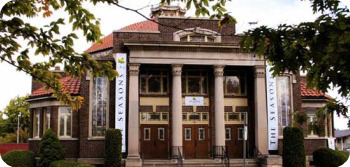
In the first of two appearances, the Tom Harrell Quintet opened the festival Friday evening in The Seasons' acoustically perfect performance hall in Yakima, Washington. With the polish and assurance developed in their years together, Harrell's band combined an edge of adventurousness that, by the time the first piece ended, had the audience buzzing. Alternating between flugelhorn and trumpet, Harrell locked up with 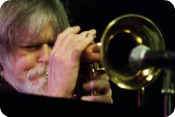 tenor saxophonist Wayne Escoffery in the lines of the leader's closely crafted compositions. Harrell, Escoffery and pianist Danny Grissett soloed brilliantly and at length. Some of the pieces were from Harrell's new CD Roman Nights. The rich harmonies and compelling melody of "Let the Children Play" captivated the audience. Escoffery, bassist Ugonna Okegwo and drummer Rudy Royston left the stage to Harrell and Grissett for an achingly beautiful duet performance of "Roman Nights." The song seems bound to take its place with "Sail Away" as one of Harrell's finest writing achievements.
tenor saxophonist Wayne Escoffery in the lines of the leader's closely crafted compositions. Harrell, Escoffery and pianist Danny Grissett soloed brilliantly and at length. Some of the pieces were from Harrell's new CD Roman Nights. The rich harmonies and compelling melody of "Let the Children Play" captivated the audience. Escoffery, bassist Ugonna Okegwo and drummer Rudy Royston left the stage to Harrell and Grissett for an achingly beautiful duet performance of "Roman Nights." The song seems bound to take its place with "Sail Away" as one of Harrell's finest writing achievements.
For The Seasons festival, Harrell premiered "Thought Waves" and "Modern Times." The latter title may be laced with mild irony. Its rhythmic emphasis and melodic simplicity are in the mold of tunes written by Horace Silver, in whose quintet Harrell played for four years in the 1970s. The improvisation by the quintet, however, was strictly of the new century, with expansive soloing by all hands. At the end of the concert, the crowd was on its feet cheering and brought Harrell out for three curtain calls.
Saturday night, the Harrells and pianist Bill Mays played a concert of new and old music for orchestra and soloists. It opened with the Yakima Symphony Chamber orchestra, conducted by its music director Lawrence Golan, playing Gunther Schuller's piquant arrangements of "The Entertainer" and "The Early Winners," early 20th century rags by Scott Joplin, Harrell and his quintet joined the orchestra for four sections of Harrell's "Wise Children." He recorded the suite in 2003 but this music from it received its first live performance at The Seasons. "Wise Children" draws on inspiration from African, Brazilian, Afro-Cuban and European music. It represents some of Harrell's most resourceful writingthe mesmerizing vamp played by strings and percussion under his horn on "Kalimba," the gorgeous melody of "Ballad in D" intoned by Escoffery, the harmonies of the elegiac title piece and the Latin rhythm fiesta called "Paz."
Following intermission in this ambitious program, Golan and the chamber orchestra played three pieces inspired by jazz in its early years. First was Darius Milhaud's La création du monde, written in 1923. Full of dissonances, blues references andfittinglygreat creative energy, the Milhaud is often described as ahead of its time in its use of jazz in a classical setting. Then, five years almost to the day after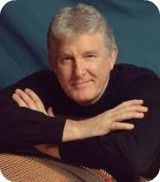 his trio gave the performance that opened The Seasons, Bill Mays went to the Steinway as soloist with the orchestra. First, they played George Antheil's 1925 A Jazz Symphony, a 12-minute romp whose raucousness, intensity, dense orchestration and humor at once admire the jazz of the twenties and poke fun at it. Integrated into the piece, the piano part places on the performer huge technical demands. Mays met them with gusto.
his trio gave the performance that opened The Seasons, Bill Mays went to the Steinway as soloist with the orchestra. First, they played George Antheil's 1925 A Jazz Symphony, a 12-minute romp whose raucousness, intensity, dense orchestration and humor at once admire the jazz of the twenties and poke fun at it. Integrated into the piece, the piano part places on the performer huge technical demands. Mays met them with gusto.
The concert concluded with George Gershwin's Rhapsody In Blue in the version Paul Whiteman commissioned for his Experiment in Modern Music concert at Aeolian Hall in New York. Gershwin was the piano soloist. Mays is the first Rhapsody In Blue pianist to open up the piece for improvisation since the composer that night in 1924. From the famous opening clarinet glissando, memorably executed by Jeffrey Brooks, the orchestra and Mays were fully into the spirit of the piece. But near the end, when Golan rested his baton, Mays took ownership. His more than five minutes of improvisation built on Gershwin's themes but also had perspective on jazz development over eight decades and incorporated idioms from all of it. The intensity and passion of his spontaneous invention brought a roar from the audience as the orchestra reentered and, when the piece ended, there was sustained applause that resulted in Mays' repeated returns to the stage for bows. When the entire Saturday night concert was repeated for a new audience on Sunday afternoon, the orchestra lacked the same edge in the Gershwin, but Mays' improvisation was even more powerful, with harder swing and new elements of whimsy, including several bebop quotes. If this Rhapsody In Blue wasn't recorded, it should have been.
[image error]Sunday evening, recovered from his exertions of the afternoon, Mays returned for a concert reuniting him with bassist Martin Wind and drummer Matt Wilson. They had not played together as the Bill Mays Trio since a concert at The Seasons in 2007. No refamiliarization was necessary. From "With a Song in My Heart" to "You Go to My Head" at the end, they had the energy and empathy that established them as perennial favorites in polls. A few high points in a concert that was a high point:
A stately "Send in the Clowns" developing into something like a blues with intimations of [image error] Ravel
Wilson's "Music House" solo, complete with a press roll that he made so quiet it could barely be heard, and use of his left foot as a snare drum damper
In the same piece, the blues feeling the trio developed, reminiscent of a 1940s jump band
Thelonious Monk's rarely played "Eronel, with all kinds of Monkish business by Mays, and Wind beginning his long, adventurous solo with a chorus of melody
Because of the computer kerfuffle, I missed most of the first half of Monday's concert by The Finisterra Piano Trio and The Seasons String Quartet, launching the extensive classical portions of the festival. It had music by Gershwin, Samuel Barber, David Rakowski , Wang Jie, Beth Wiemann, Michael Laster and Slavko Krstic. Laster and 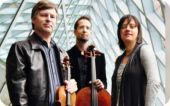 Kristic are among nine composition fellows studying at the festival with artistic director Daron Hagen. I heard the last song in Rakowski's Double Fantasy, played by Finisterra and sung with passion in Spanish by soprano Gilda Lyons. Following intermission, Finisterra played Beethoven's Piano Trio in D Major, Op. 70, the roar and rumble of its powerful middle movement anchored by pianist Tanya Stambuk, with violinist Simon James and cellist Kevin Krentz.
Kristic are among nine composition fellows studying at the festival with artistic director Daron Hagen. I heard the last song in Rakowski's Double Fantasy, played by Finisterra and sung with passion in Spanish by soprano Gilda Lyons. Following intermission, Finisterra played Beethoven's Piano Trio in D Major, Op. 70, the roar and rumble of its powerful middle movement anchored by pianist Tanya Stambuk, with violinist Simon James and cellist Kevin Krentz.
There was more chamber music last night, including two pieces by composer-in-residence Larry Alan Smith. His song cycle on poetry of Emily Dickinson, A Slash of Blue! A Sweep of Gray!, got a stunning performance by Ms. Lyons and pianist Robert Frankenberry, as did the versatile Ms. Lyons' compositions "Owl Light" and "Between Wolf and Dog" by Krentz playing unaccompanied cello. Krentz played three of Hagen's Love Songs for Cello and Piano with the composer accompanying.
Tonight, the festival continues with Michael Wimberly's Africa: The Power of Drum and Dance. This is a return appearance at the festival by the New York percussion expert, who brings with him members of his troupe and incorporates into his concert students from schools throughout the Yakima valley for a carnival of drumming, dancing and singing. It is a vital part of the educational outreach function of The Seasons' nonprofit contribution to the culture of the region.
October 12, 2010
Hope On The Internet Front
It wasn't sludge (see yesterday's entry), but it did get worse. The problem was intermittent and untraceable even with cable company equipment so sophisticated it might be on loan from the CIA. Now, however, after a pair of two-hour visits from techs, long, baffling phone calls with two other techs and, finally, the purchase and installation of a new piece of equipment, the Rifftides World Headquarters web connection seems alive and stable. That's what I thought 24 hours ago. After a glass of something red and a good night's sleep, I'll try to post a catchup piece on The Seasons Fall Festival. Hope springs eternal.
night's sleep, I'll try to post a catchup piece on The Seasons Fall Festival. Hope springs eternal.
October 10, 2010
Afloat AgainOn Monk's Birthday
It could have been worsetoxic red sludge, for instance.
 The technician just left after performing CPR on the internet connection, which was out of commission for 48 hours. The Rifftides staff will resume posting soon. Now, ears open wide and notebook in hand, we're off to The Seasons for the next concerts of the Fall Festival. This afternoon,Tom Harrell's quintet and pianist Bill Mays are performing Harell, Antheil and Gershwin with the Yakima Symphony Chamber Orchestra. Tonight, it's the Mays trio with Martin Wind and Matt Wilson.
The technician just left after performing CPR on the internet connection, which was out of commission for 48 hours. The Rifftides staff will resume posting soon. Now, ears open wide and notebook in hand, we're off to The Seasons for the next concerts of the Fall Festival. This afternoon,Tom Harrell's quintet and pianist Bill Mays are performing Harell, Antheil and Gershwin with the Yakima Symphony Chamber Orchestra. Tonight, it's the Mays trio with Martin Wind and Matt Wilson.
In the meantime, if Thelonious Monk were alive he would be celebrating his 93rd birthday. Let us all celebrate Monk. This 1966 performance of "Blue Monk" with Charlie Rouse, Larry Gales and Ben Riley has been viewed 1,140,150 times. No wonder.
Rifftides is currently at sea
October 8, 2010
The Seasons Fall Festival And Scott Robinson
Among the dozens of musicians either already here or headed toward my current home town for the eight days of The Seasons Fall Festival are Tom Harrell and his quintet, Bill Mays, Martin Wind, Matt Wilson, Scott Robinson, the African percussion expert Michael Wimberly, composer Daron Hagen and a raft of classical players, composers and conductors. Thursday evening I heard Harrell rehearsing his Wise Children suite with the Yakima Symphony Chamber Orchestra. Whew. It's something to look forward to. For the schedule and details of the festival, go here.
Robinson will appear with Wilson and singer-pianist Dee Daniels in Wind's group. Coincidentaly, Bill Kirchner is devoting his radio program this weekend to Robinson and his menagerie of every instrument known to man. That's only a slight exaggeration. Here's Kirchner's listening advisory:
Recently, I taped my next one-hour show for the "Jazz From The Archives"
series. Presented by the Institute of Jazz Studies, the series runs every
Sunday on WBGO-FM (88.3) in the New York-New Jersey area.
Jazz has had some remarkable multi-instrumentalists, but probably none with
the scope of Scott Robinson (b. 1959). A short list of his instruments includes saxophones (from sopranino to contrabass), flutes, clarinets, trumpet, trombone and theremin--all played on a world-class level. And he is comfortable in jazz idioms ranging from the 1920s to the avant-garde.We'll hear Robinson playing with the Bob Brookmeyer, Tom Pierson, and Maria Schneider orchestras, as well as with drummer Klaus Suonsaari and his own small groups.
The show will air this Sunday, October 10, from 11 p.m. to midnight, Eastern Daylight Time.
NOTE: If you live outside the New York City metropolitan area, WBGO also
broadcasts on the Internet at www.wbgo.org.
If you are attending The Seasons Fall Festival, I'll be around. Please say hello. I may even take notes and post a report or two on Rifftides.
In Breve (2): Rosenthal, Carter, Bang, Chang
Continuing the not quite helter-skelter survey of recent recordings that we began last week, here are four more worth your attention:
Ted Rosenthal, Impromptu (Playscape). Rosenthal interprets classical composers' themes with respect, but he is not reluctant to add or subtract an element to make them work for improvisation. The [image error]pianist, bassist Noriko Ueda and drummer Quncy Davis approach pieces by Bach, Schubert and Brahms as they would those by other revered composerssay, Monk, Ellington and Mulligan. Rosenthal found that only the main strain of Chopin's Nocturne in F minor suited the trio's purpose, so that's what they blow on. It becomes a gorgeous standard ballad from the Great Polish Songbook. Tchaikovsky's "June," the Barcarolle in G minor from The Seasons, has undertones of blues and parallel-hands passages reminiscent of Erroll Garner or Lennie Tristano. Rosenthal gives the Brahms Intermezzo in B Flat minor an overt blues treatment, with a lunging samba feel in the rhythm. The Schubert Impromptu in G flat goes from 6/8 to 4/4 and culminates in a stunning role reversal of the hands as Rosenthal plays the melody in the bass clef and decorates it with lightning runs on top. The trio also get their licks in with Mozart, Puccini, Bach and Schumann. This is not the tiresome foolery that used to be called "jazzing the classics." It is serious music making on substantial material, and it is great fun.
Regina Carter, Reverse Thread (E1). There are moments on violinist Carter's most recent CD that evoke Cajun music, Brazilian choro, Cuban danzon, even the feeling of an Appalachian hoedown. Carter's inspiration for this collection, hoedown perhaps aside, is from the[image error] African sources of much music we often assume to be from South America or the Caribbean. She spent three years and part of her half-million-dollar MacArthur Foundation "genius" grant researching African music, traveling to the continent to immerse herself in it. The result is a dozen pieces with enormous variety. Most are interpretations of traditional music, or songs by composers from Kenya, Senegal, Mali and South Africa. Carter's composition "Day Dreaming on the Niger" blends into the flow of the African pieces. Yacouba Sissoko, a virtuoso of the 21-stringed Malian kora, is effective on five tracks, but the African atmospherics and the authenticity don't depend on him. Carter, bassist Chris Lightcap, guitarist Adam Rogers, accordionists Gary Versace and Will Holshouser, and drummer Alvester Garnett have absorbed the ethos and rhythms of the music. Through it all is the incomparably rich violin and imagination of Regina Carter.
Billy Bang, Prayer For Peace (TUM). In an album mostly of his own compositions, the violinist opens with Stuff Smith's "Only Time Will Tell." Bang and trumpeter James Zollar might be 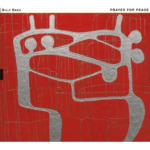 summoning the spirits of the seminal jazz violinist Smith (1909-1967) and his Onyx Club sidekick of the 1930s, Jonah Jones. The rest of the CD is redolent of the music Bang has made with Sun Ra, Don Cherry, the bassist Sirone and others in the avant garde, and of his love for John Coltrane. That is not to say that it is experimental or inaccessible. Even at its most daring, Bang's music has always had an engaging old-timey quality that he transmits to those who play with him, including Zollar, bassist Todd Nicholson, pianist Andrew Bemkey and drummer Newman Taylor-Baker, the band of young musicians he has employed for some years. The title tune, just short of 20 minutes, runs in a tranquil modal course that reflects the quest for peace that Bang has promoted with music since his experience in the Viet Nam war. Bang's danceable version of "Chan Chan," the Afro-Cuban anthem made famous by the Buena Vista Social Club, is among the pleasures here. The Finnish record company TUM lavished commendable care on the sonic production and packaging of this CD.
summoning the spirits of the seminal jazz violinist Smith (1909-1967) and his Onyx Club sidekick of the 1930s, Jonah Jones. The rest of the CD is redolent of the music Bang has made with Sun Ra, Don Cherry, the bassist Sirone and others in the avant garde, and of his love for John Coltrane. That is not to say that it is experimental or inaccessible. Even at its most daring, Bang's music has always had an engaging old-timey quality that he transmits to those who play with him, including Zollar, bassist Todd Nicholson, pianist Andrew Bemkey and drummer Newman Taylor-Baker, the band of young musicians he has employed for some years. The title tune, just short of 20 minutes, runs in a tranquil modal course that reflects the quest for peace that Bang has promoted with music since his experience in the Viet Nam war. Bang's danceable version of "Chan Chan," the Afro-Cuban anthem made famous by the Buena Vista Social Club, is among the pleasures here. The Finnish record company TUM lavished commendable care on the sonic production and packaging of this CD.
Jeff Chang, It's Not What You Think (Chee May). Chang came to the United States from Taiwan in his teens.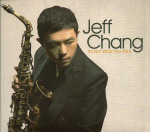 He studied at the New England Conservatory with George Russell, George Garzone and Steve Lacy, among others, and emerged a fresh voice on alto saxophone. His debut CD is impressive for his big sound, his broad conceptual range, the quartet's cohesiveness and the quality of his original compositions. In any given piece, Chang is likely to go from lyrical melody to mutual quartet improvisation full of risk and exhilaration. Fellow NEC grads pianist Carmen Staaf, bassist Kendall Eddy and drummer Austin McMahon are his empathetic rhythm section. Staaf's touch, subtle way with chords and firm time interact intriguingly with Chang's post-bop inventiveness.
He studied at the New England Conservatory with George Russell, George Garzone and Steve Lacy, among others, and emerged a fresh voice on alto saxophone. His debut CD is impressive for his big sound, his broad conceptual range, the quartet's cohesiveness and the quality of his original compositions. In any given piece, Chang is likely to go from lyrical melody to mutual quartet improvisation full of risk and exhilaration. Fellow NEC grads pianist Carmen Staaf, bassist Kendall Eddy and drummer Austin McMahon are his empathetic rhythm section. Staaf's touch, subtle way with chords and firm time interact intriguingly with Chang's post-bop inventiveness.
October 6, 2010
Brown, Green And Hamilton: "Cotton Tail"
While the Rifftides staff prepares the next installment of In Breve, we don't want you to feel abandoned. We have been holding the following video for just such an occasionBenny Green, piano; Ray Brown,bass; Jeff Hamilton, drums; and the WDR Big Band conducted by John Clayton, in 1994, playing Duke Ellington's "Cotton Tail." In the right hands, "I Got Rhythm's" harmonic changes never grow old. Green has moments in which he might be the reincarnation of Bud Powell. The saxophone section brings back Ben Webster.
Brown, Green And Hamilton: "Cottontail"
While the Rifftides staff prepares the next installment of In Breve, we don't want you to feel abandoned. We have been holding the following video for just such an occasionBenny Green, piano; Ray Brown,bass; Jeff Hamilton, drums; and the WDR Big Band conducted by John Clayton, in 1994, playing Duke Ellington's "Cottontail." In the right hands, "I Got Rhythm's" harmonic changes never grow old. Green has moments in which he might be the reincarnation of Bud Powell. The saxophone section brings back Ben Webster.
Doug Ramsey's Blog
- Doug Ramsey's profile
- 2 followers




